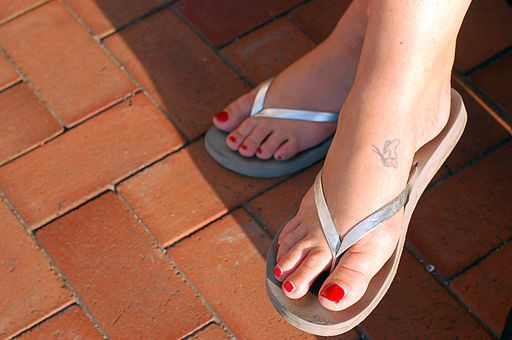Pregnant Feet Swelling Causes Permanent Foot Size Increase

Feet swelling while pregnant? It's a common problem for women during pregnancy, but new research brings the bad news that larger shoes may be necessary long after delivery.
Pregnant feet swelling can cause a permanent change in foot size and shape.
Women often report flat feet while pregnant, a symptom that is probably caused by the extra baby weight bearing down to flatten the arches of the feet and increase feet size.
A new study published in the American Journal of Physical Medicine & Rehabilitation confirms that the swelling and loss of arch height that comes with pregnancy can be permanent, with the increase in foot size lasting long after pregnancy.
"I had heard women reporting changes in their shoe size with pregnancy, but found nothing about that in medical journals or textbooks," said Dr. Neil Segal, associate professor of orthopaedics and rehabilitation at the University of Iowa, in a statement.
Segal decided to scientifically measure the feet swelling of pregnant women in the first trimester of their pregnancy, and then five months after they gave birth.
"We found that pregnancy does indeed lead to permanent changes in the feet."
The study, supported by the American Geriatrics Society and the National Institute on Aging, included 49 pregnant women, collecting arch measurements at both time points before and after they gave birth.
The results showed that for between 60 and 70 percent of the women, swelling led to longer and wider feet five months after they gave birth.
The average foot arch and arch rigidity of the women decreased markedly after they gave birth, causing a 2-10 millimeter increase in foot length and arch drop five months after being pregnant.
Feet swelling is likely to be greatest for women after a first pregnancy. The study findings suggest that second, third, or later pregnancies do not alter foot size much more than it increases the first time.
This study is corroborated by other experts. Dr. Bret Ribosky, president of the American College of Foot and Ankle Orthopedics and Medicine, told Parenting.com that a woman's foot size can increase by a half size or more during pregnancy.
"The same hormones that are released to relax the pelvic area also loosen the ligaments in the foot," said Ribotsky. "In addition, the increased body weight of pregnancy lowers the arches, further adding to the foot's length and width."
It's important for women to accept the growth of their shoe size while pregnant. Swelling feet should not be forced into uncomfortable shoes.
"Too-tight shoes weaken the muscles in the ball of the foot and the ligaments that hold the toes straight," Dr. Ronald Smith, associate professor of orthopedic surgery at Harbor-UCLA Medical Center, told Parenting. "And that can set the stage for foot problems."
Aside from feet swelling, those foot problems while pregnant can include ingrown nails, corns caused by pressure from tight shoes, and bunions, which are bumps at the base of the big toe that grow with friction from shoes. Higher heels mean a higher likelihood for foot problems later on.
In future research, Segal hopes to follow up with the 49 women in this study to see whether the changes in their feet size can lead to musculoskeletal problems like arthritis as they age.
"We know that women, and especially women who have had children, are disproportionately affected by musculoskeletal disorders," he said.
Segal expects that foot size swelling can help explain why pregnant women are at a higher risk of developing arthritis pain in their feet, knees, hips, and spines later on. He plans to conduct further work on possible rehabilitation measures to prevent pregnancy-related arch drop.
The takeaway: pregnant feet swelling can lead to a permanently larger shoe size, and it's important to wear comfortable shoes during and after pregnancy in order to avoid foot problems later in life.



























